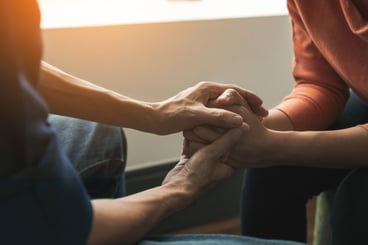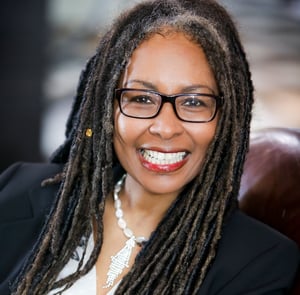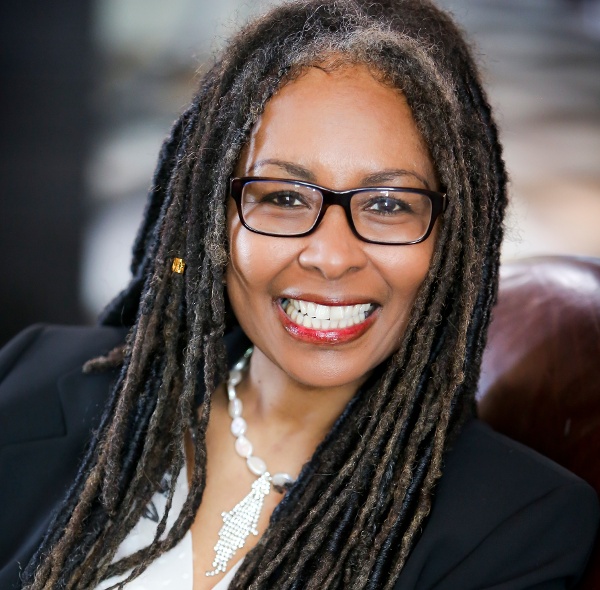Fear is one of our least favorite guests. When fear shows up—and it shows up for all of us—we’re rarely in a position for it. Right now, we might be trying to get away from some fear before it arrives—even if we need to vacate the premises—our body.
The more we try to run away from our fears, the stronger it gets. Fear goes where we go—regardless of how much we may stuff it, medicate it, or deny it.
This sounds like bad news. But it is actually good news if we learn how to work with fear rather than run from it. Working with it means turning toward it intellectually—and emotionally.
There really is no point in trying to say to ourselves that we shouldn’t be afraid because we only shame ourselves for being afraid, which drives our fearful selves into more activities … more busyness to compensate for being afraid—anything to get away from it.

The Biochemistry of Fear
I won’t get into the whole physiology of fear. Still, I would be remiss if I didn’t say something about the electrifying biochemistry of fear—increasing blood flow, heart racing, and gastrointestinal issues. Flight-fight-freeze responses are part of the physiology of fear.
Fear can also show up in many forms:
At the core, fear communicates:
-
I am not safe
-
I am threatened
-
People I care about are in danger
Fear never undercuts rationality. That’s why we can’t just think it away.

How Fear Slips into Our Relationships
Fear can be channeled into anger. When fearful folks get really angry, we are not afraid anymore—we’re just angry!
Anger is not a solution for fear, but what comes out of the anger can be empowering. When I work with couples suffering from abuse-generated, debilitating fear, I find that helping them mobilize what they had to shut down during their original trauma—is not only freeing and healing; it also involves the raw expression of anger.
The more intimate we are with our anger, i.e., expressing it, the less fearful we tend to be because we are not letting our anger turn into fear.

Your Turn – Getting to Know Your Fear – Journal Writing Exercise
First, get out a pencil/pen and some paper. Below you will find a list of incomplete sentences. Complete them as generously and thoroughly as possible, out loud, and write them down.
After you say it, don’t edit. Words may not immediately come up, but more often than not, they will. Speak as freely and sincerely as possible.
When you are done, take some deep breaths and rest for a few minutes. Here we go.
-
What scares me the most is …
-
As I feel this, my heart …
-
If my heart could speak right now, it would say …
-
My breathing feels …
-
My usual way of numbing myself is …
-
What scares me about the way I numb myself is …
-
What is most obvious about my fear is …
-
Knowing that many others are also experiencing such fear makes me feel …
-
What I wish I could do for others is …
-
What I can do for others is …
-
What’s happening to my fear right now is …
-
No matter what happens, I am …
Congratulations! If it feels natural, repeat this process with you as a listener and your partner/friend as the sharer of fear.
Always a work in progress. Feel free to clap back and let me know how it goes for you. If you're experiencing fear right now, we are here to help with Imago Relationship Workshops and Relationship Therapy. We also have Online Couples Therapy and Online Couples Workshops right now!
Discover more about Imago with our Imago Professional Membership, Imago Professional Facilitators, Imago Professional Training and Imago Educational Webinars.
Connect. Transform. Thrive.
 This blog was written by Paula Smith, Ph.D., MFT, M.Div.
This blog was written by Paula Smith, Ph.D., MFT, M.Div.
Dr. Paula is passionate about helping ALL couples create safe, healing, egalitarian, connected partnerships in deeply perceptive, precise, and appropriately playful ways.
For 16 years, Dr. Paula has worked exclusively with couples. Over the past 8 years, she has developed a specialization in 2 and 3 Day Private Intensives for couples in crisis, engaged couples, and couples struggling in the aftermath of an affair. The Couple Private Intensives are process-driven, exclusive, profound, and life-changing because they allow couples to explore relational issues and dynamics that cannot be understood in shorter sessions. She dives deep with partners over a span of days for deep exploration, understanding, connecting, and fun. Dr. Paula opens couples’ eyes to previously unseen and unfolding possibilities in their relationship.
Having experienced the miracle of healing and recovery herself, Dr. Paula's life’s work is rooted in a deep belief in the transforming power of relationships. She's been active in 12-step spiritual communities for 36 years. She teaches Introduction to Couples Therapy at Antioch University New England and has also taught courses on topics related to Race, Racism, Whiteness at Harvard Divinity School, Harvard Medical School, Rhode Island College, and Imago Relationships North America (IRNA).
Paula is a member of the RI Association of Marriage and Family Therapy, American Association of Marriage and Family Therapists, Association of Pastoral Counselors, Imago Relationship International, Antioch Alumni Association, and Harvard Alumni Association, and a co-author of the article “Marriage & Family Therapy Training Programs and Their Integration of Lesbian, Gay, and Bisexual Identities,” published in the Journal of Feminist Family Therapy and “Post Katrina Theology," published in Harvard Divinity Magazine.




